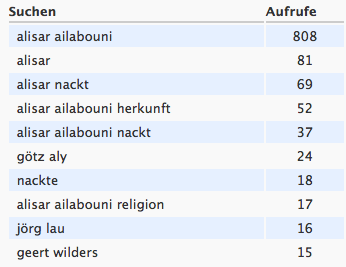In einem sehr mutigen Editorial für die Jüdische Allgemeine segelt Bilkay Öney, SPD-Abgeordneten im Berliner Abgeordnetenhaus, hart am Wind:
„Die Regierungspartei AKP scheint zwei Dinge leider nicht voneinander trennen zu können: die außenpolitische Linie in ihrer Haltung zu Israel und die innenpolitischen Erfordernisse für die knapp drei Millionen Bürger türkischer Herkunft, die in der Bundesrepublik leben.
Die türkische Gemeinde bildet die größte Minderheitengruppe in Deutschland. Sie ist gleichzeitig diejenige, die im Mittelpunkt der Integrationsdebatte steht und sich am häufigsten gegen Vorurteile wehren muss. Für dieses Anliegen ist die Zusammenarbeit mit der jüdischen Gemeinschaft unerlässlich. Bisher hat diese die türkische Minderheit stets verteidigt und in Schutz genommen: beim Kopftuchstreit, beim Moscheenstreit und als in Mölln (1992) und Solingen (1993) die Häuser von Türken brannten. Nun brennt es politisch wieder. Denn jemand zündelt. Aber wo ist die türkische Stimme in Deutschland, die sich für jüdische Belange starkmacht?
(…) Tatsächlich finden sich Ähnlichkeiten und Parallelen zwischen beiden Minderheiten – auch in religiösen Bräuchen; von der Beschneidung bis hin zum Gebot, kein Schweinefleisch zu essen. Immer, wenn türkische Jugendliche sich mit ihren palästinensischen Schulfreunden, ihren muslimischen Glaubensbrüdern, solidarisieren und judenfeindliche Äußerungen von sich geben, hilft es, sie auf diesen Vergleich hinzuweisen. Jugendliche kann man aufklären. Die Schule ist dafür ein geeigneter Ort und bietet auch genügend Anschauungsmaterial.
Noch erschreckender ist es, wenn judenfeindliche Äußerungen in intellektuellen Kreisen der deutsch-türkischen Community kursieren. Neulich etwa, als eine türkische Professorin monierte, die Juden würden nicht nur die Finanzwelt beherrschen, sondern auch die Wissenschaft. Alle Nobelpreisträger seien Juden, sagte sie, das könne doch kein Zufall sein. In solchen Momenten schnürt es mir die Kehle zu. Aufgewühlt stellte ich der Professorin Gegenfragen: Wie hätte wohl das türkische Militär reagiert, wenn sich israelische Friedensaktivisten gegen den Willen Ankaras auf den Weg in die kurdischen Gebiete gemacht hätten, um die PKK mit Hilfsladungen zu versorgen? Hätte das türkische Militär die Israelis passieren lassen?“



